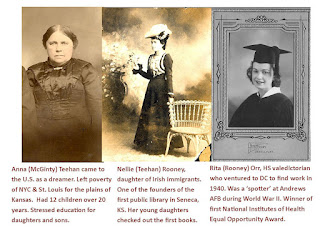By Elaine L. Orr
Today, August 26, 2023, is the 103rd anniversary of ratifying the 19th amendment, which granted women in the United States the right to vote. It's hard to fathom that half the population wasn't allowed that basic right, but when the nation was founded only property owners could vote. This translated to white men, because women didn't own property and most Black Americans were slaves.
For most people, these are facts we understand, regret, and move forward, working to ensure all eligible citizens can vote.
My mother's mother was the daugher of Irish immigrants, Cornelius and Anna Teehan. He was treasurer of the local school district, and people made fun of him because he wanted his daughters to have as much education as his sons. On the plains of Kansas in the 1870s and 1880s, high school would have been the top option, and I assume she went to Westmorland High School.
 One of the first things I remember my mother (born in 1922) telling me was something her mother (Nellie Teehan Rooney, 1881-1956) relayed to her early on. That was that mom's life would be very different than her mother's because all of her life mom would know she could vote. Not that she could cast ballots, but that she would KNOW that she could. She was equal.
One of the first things I remember my mother (born in 1922) telling me was something her mother (Nellie Teehan Rooney, 1881-1956) relayed to her early on. That was that mom's life would be very different than her mother's because all of her life mom would know she could vote. Not that she could cast ballots, but that she would KNOW that she could. She was equal.
Recently, I found a 1914 article in the Seneca, Kansas paper about local elections. It notes that my grandfather, Thomas E. Rooney (1878-1931), was a candidate for councilman. Only the 2nd precinct (his) had two contesttants. The article notes, "While it is likely to be spirited, all signs point toward a good-natured measurement of strength."
In a town of largely Republican voters, he was a Democrat and I don't think he won, as I never heard him referred to as a local official.
The final paragraph is what interested me most. "The Second was the only one in which the ladies turned out to attend the nominating convention. Quite a number were present and took considerable interest in witnessing how things are done."
These ladies would be my grandmother and her friends! She was active in different civic causes. Seneca had no public library, so she and her friends raised money to found one. My mother and her younger sister were pictured taking out the first books. (They were very cute.)
Here's where research gets even more fun. An article about the Seneca Free Library relays the following:
The Library was an idea generated by the Seneca Women's Club embroidery circle in 1908. As they worked, they often discussed books and the need for a town library. After collecting 300 books they persuaded a drug store to give them shelving space. Town administrators noticed their efforts and offered better space in City Hall. In 1915, the collection grew and was moved to Seneca High School. The Old Stone Universalist Church -- a fine structure built in 1869 of Kansas soft gray stone with stained glass windows and bell tower -- was acquired in 1928 and it became the collection's permanent home. As the library continued to grow, a new wing was added in 1997, a handsome complement to the original church. The project is an example of Seneca's growing interest in the reuse of historic architecture.
My mother and her sister would have been the first borrowers at the 1928 library, and my grandmother was a member of that Women's Club! Not likely the embroidery circle, as she didn't like needle work and she had several young sons at that time.
The pictures at right depict my grandmother, Nellie, her mother Anna, and my mom, Rita Rooney Orr. Of the three, two voted during their lifetimes.
I never met either of my mother's parents, so I treasure finding nuggets that go beyond the few verbal stories I heard. And I love that reading and voting were an important part of their lives.
* * * * *
To learn more about Elaine L. Orr, visit her website or sign up for her newsletter

No comments:
Post a Comment